Your shower habits may be inflaming + drying your skin
BABY, TURN DOWN THE TEMPERATURE
As the days become colder and wetter it is oh so tempting to turn up the heat on your AM/PM shower and languish under that warm river of delight. But if you are someone who suffers from dry skin or conditions such as eczema/psoriasis then potentially you should think twice.
You may or may not realise, but skin is coated by an oily, waxy substance called sebum. Produced by sebaceous glands in the skin, sebum is full of cholesterol, fatty acids, glycerides, and squalene…essentially fatty molecules that help to reduce water loss and protect skin. In conditions such as acne, an excess production of sebum can provide a wonderful food source and environment for bacterial proliferation.
A long hot shower for sebum is akin to putting butter in a microwave. What starts as a semi-solid product that coats the skin, liquefies with heat and may be removed, thus ridding the skin of its natural barrier.
Particularly as the atmosphere loses humidity during the colder months, and skin moisture follows, if you are someone prone to dry, inflamed, sensitive, red or irritated skin consider you hygiene routine. Recommendations include:
-
showering only once a day (unless activity necessitates it)
-
keep showers short (<5 mins) and active i.e. don’t stand under them stationery, move about to avoid exposing the same areas of skin
-
avoid extreme temperatures
-
focus soap and fragrance on the dirtiest areas – legs and arms don’t need lathering every shower
-
wash more sensitive areas last
-
shave at the end of your shower routine as hair has had time to soften
-
pat dry to avoid excessive friction
-
moisturise


